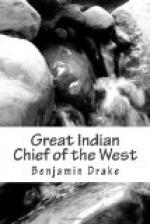In the late contest between the United States and Black Hawk’s band, Keokuk and a majority of the Sacs and Foxes, took no part. Black Hawk made several efforts to induce them to unite against the whites, which they were strongly inclined to do, not only from their love of war and of plunder but on account of the injustice with which very many of them believed they had been treated by the people of the United States. It required all of Keokuk’s influence and moderation to prevent the whole nation from enlisting under the Black Hawk banner. He requested the agent of the American Government to send to his village, on the west side of the Mississippi, a white man who understood the Sac language, and who might bear witness to his, Keokuk’s sincerity and faithfulness to the whites. Such a person was sent. The excitement raised by Black Hawk and the war in which he was engaged, continued to increase among Keokuk’s people. “He stood on a mine, liable to be exploded by a single spark. He was in peril of being slain as the friend of the whites. He remained calm and unawed, ruling his turbulent little state with mildness and firmness, but at the constant risk of his life. One day, a new emissary arrived from Black Hawk’s party. Whiskey was introduced into the camp, and Keokuk saw that the crisis was at hand. He warned the white man who was his guest, of the impending danger, and advised him to conceal himself. A scene of tumult ensued. The emissary spoke of blood that had been shed—of their relations being driven from their hunting grounds—of recent insults—of injuries long inflicted by the whites—hinted at the ready vengeance that might be taken on an exposed frontier—of defenceless cabins—and of rich booty. The desired effect was produced. The braves began to dance around the war pole, to paint and to give other evidences of a warlike character. Keokuk watched the rising storm and appeared to mingle




